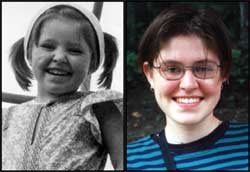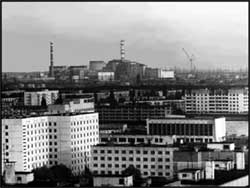Veronika's Story
 Personal Memories and Reflections of Chornobyl
Personal Memories and Reflections of Chornobyl
by Veronika Glukhova
April 21, 1999
This is the opening story in the new book "Nuclear Legacy: Students of Two Atomic Cities"
Ironically enough, my whole life has always revolved around nuclear energy, literally, like an electron spinning around the nucleus. I was born on August 26, 1980 in the town of Obninsk, about two hours away from Moscow, the town where the first nuclear power plant in the world was built and where my grandparents worked. At the time, my parents were finishing their masters' degrees in one of the most prestigious universities in the former USSR - Moscow Institute of Physics and Engineering; my father - in Nuclear Physics and Engineering, my mother - in Computer Engineering. About a year later we moved to Pripyat, Ukraine, a newly built town where my parents started working at a nuclear power plant. A year after, my brother was born.

April 26, 1986 was a normal Saturday, sunny, incredibly warm for the North Ukraine, and very windy. It was a typical day, until around 7 in the morning when my father received a call. He told my mom something and left. I don't remember too much, just how frustrated I was to be inside when all the kids were out playing; my mom wouldn't let me out of the door. The windows were closed and it was very hot. The next day, on April 27, we all left. The whole town of 50,000 residents. Buses arrived thirty-six hours after the worst nuclear disaster in history, the Chornobyl accident, occurred less than two miles away from where we lived.
One of the scariest things about the accident was that very few people knew exactly what had happened and no one was actually able to predict the consequences. Leaving wasn't hard. The announcement of evacuation came on Sunday morning. The residents were told to take only their documents, cash, pillows, and blankets for "a few days stay in the country". The authorities lied; they told families that they would be coming back in three days, so people left everything behind. We never returned. The city remains closed. My father put us on a bus and stayed behind. We arrived in Obninsk where all our clothes were confiscated and buried because of radioactive contamination. My brother and I underwent a medical treatment, since doctors were very impressed with the level of radioactive Iodine that had accumulated in our thyroids.
Most of the evacuated people eventually moved to Kiev, the capital of Ukraine. The majority of Chornobyl Nuclear Power Plant employees continued working at the plant for the next several years. Life went on. In fact, we, the people who were evacuated, lived as a community. When we first moved to Kiev, we were issued recently built apartments in the new part of the city. Lots of local people waited for these apartments to be built, so they could relocate from older houses. We took their places. People were very mad. Then the humanitarian aid came and we were hated again. Most outsiders weren't too educated; they considered us contagious, plagued. The first time I experienced physical effects of what had happened was just two and a half months after the accident. I woke up in the morning with horrible pains in my stomach. I was taken to the hospital and tested. At the age of five I was diagnosed with acute gastritis.
I remember going to the first grade and knowing exactly who was originally from Kiev, and who was from Pripyat. Being that young, we didn't necessarily distinguish between dislike, fear, and misunderstanding. It was normal to be asked for your name when meeting someone for the first time, and then being asked where you were from, Kiev, or Pripyat.
One of the scariest periods of my life was when I was nine. All of a sudden, the kids started to get sick. That's also the year the government decided to seriously start testing us. Since then, every spring we had to undergo a complete series of medical tests, and then, treatments. I remember spending at least a month in the hospital every year since then. Something new and wrong was discovered every year in my body. It was everywhere, it happened to all of us. The doctors didn't see it as a necessity to shield us from anything and soon most of us knew the medical terms associated with chronic diseases. No matter what had happened, it was known and understood that there were others, who suffered the same. No one had been singled out; there was no self-pity. I'm not the only one. Neither are you. Move on.
We now live in the town of Richland, in the Tri-Cities, well known for the Hanford site, another page in my "nuclear" biography. My father received a job within the Pacific Northwest National Lab's International Nuclear Safety Program. Again, he is working for Chornobyl, helping improve nuclear safety.
Last summer was the first time in the four years since we've lived here, that we got a chance to go to Russia to visit our relatives and Ukraine to visit Kiev and Pripyat. The Pripyat part was the most memorable for me, I remember it like a recurrent dream. I walk through the alienated town. It's a ghost town. It's dead. It's not the town I saw thirteen years ago. It looks like a jungle, the trees have gotten out of control, but it's not like walking through a forest, you don't hear the birds singing. My father cautions me not to touch the trees or the walls; everything is contaminated and covered with radioactive dust. We get to our apartment. The door has been kicked out. After everyone left, everything was robbed by looters or buried later by special clean-up teams. People would go to the market in Kiev and see their old possessions being sold. Not being able to stand it, I run out and break down in the middle of my old playground.
The town center has been slightly cleaned up. Just a couple of weeks before, my father escorted Vice-President Al Gore around the town. The Vice-President was quiet and somber as he toured our former hometown, asking questions about what had happened to those who had lived there.
Most people have heard at least the name Chornobyl, very few know exactly what happened and the scale of the disaster. There were thirty-one immediate victims among the plant workers and firefighters, who died during the first month after the accident, one person died in the explosion, his body was never found; and another man died in the hospital the morning after the explosion. Many more suffered from radiation sickness. Hundreds of thousands of people were exposed to extremely high levels of radiation, including area residents and military and civilian workers brought in to perform recovery activities.
The polluted thirty-kilometer exclusion zone around the plant will be contaminated for many centuries. It's hard to predict how long it will be until people will be able to live there again. The half-life of Plutonium alone is 24,000 years. Besides Ukraine, the radiation spread to Russia, Belarus, and Scandinavian countries.
Human and technological progress has a bigger impact on our lives than we think. We've been moving at an incredible speed. Our inventions make our lives easier, but the farther we go, the more complex they get. It all comes with a price. Most commonly, it's human sacrifice. Sacrifice of human emotion and life. And even though life goes on, casualties along the way do count. People are left without homes, without other people, they carry scars all their lives. The pain diminishes with time, but it never completely goes away. Years after the accident, whenever Pripyat was mentioned, I broke into tears. It used to be hard to remember the many friends, memories and toys that were left there. Locked away, hidden behind the barbed wire, in the dead zone. I wanted to go back home. Yesterday, these were emotions of a child, but they make me who I am today.
Everything in the zone and in Pripyat is a legacy of the disaster, nuclear catastrophe. Sometimes I wish those who still think about a clean nuclear war would go there to see the real picture of nuclear aftermath.
Safety and human lives should be the priority, the idea behind our actions. That's where the progress is. There have been enough lessons.
This story and many more are available in the new book "Nuclear Legacy: Students of Two Atomic Cities" written by forty student authors.